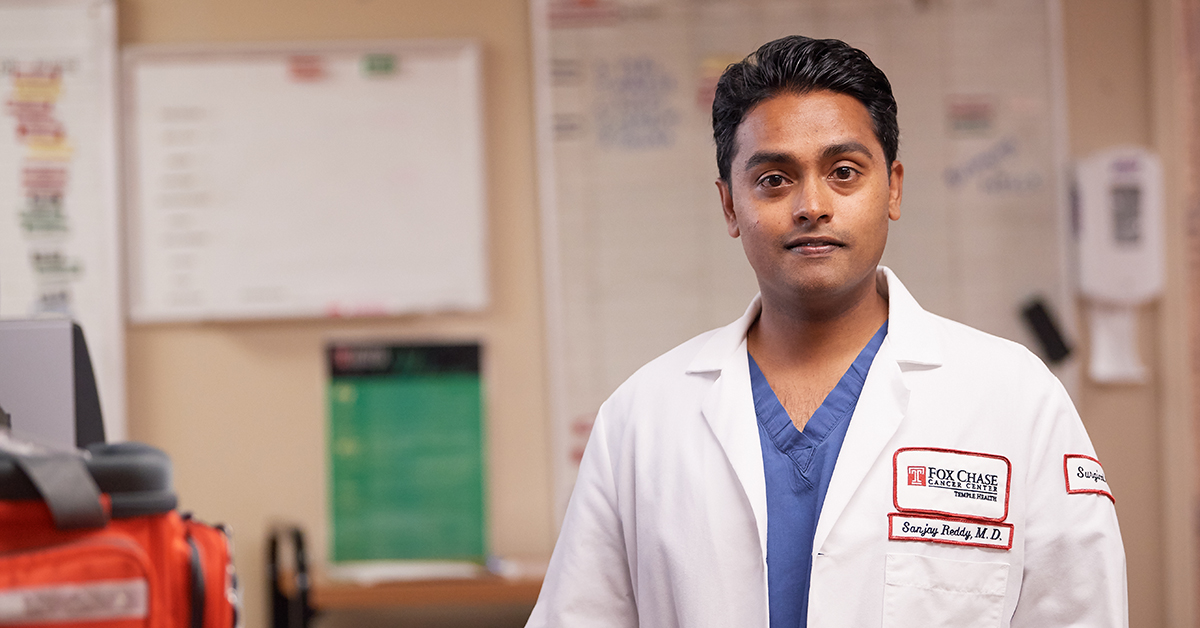
A Day in the Life of Dr. Sanjay Reddy: A Philadelphia Pancreatic Cancer Surgeon on a Mission
-
Pancreatic cancer—two words no one wants to hear. It’s a diagnosis that causes fear, anxiety, and a mix of other emotions that overwhelm patients and families facing it. As a Fox Chase surgical oncologist specializing in pancreatic cancer, Sanjay Reddy, MD, FACS knows these emotions well. He sees this fear on the faces of his patients every day, and it’s the reason he’s made it his mission to eliminate the disease.
The pursuit of this mission starts, most mornings, at 5:30 am.
5:30 am, A Busy Start to the Day
Reddy wakes up and drives just a few short miles to Fox Chase Cancer Center. His house in Elkins Park, where he lives with his wife, Meghann, and two-year-old daughter, Maddie, was chosen carefully.
As a leading pancreatic cancer surgeon in Philadelphia, Reddy cares for some of the most complex cases at Fox Chase, and he likes to know what’s going on with their care at all times.
This often means late-night trips home after long surgeries, or a quick patient check-in on Saturday and Sunday mornings. Living close means being close to his patients.
During the drive into Fox Chase, Reddy has his daily tasks planned.
6:30 am, Rounding on Patients in the Hospital
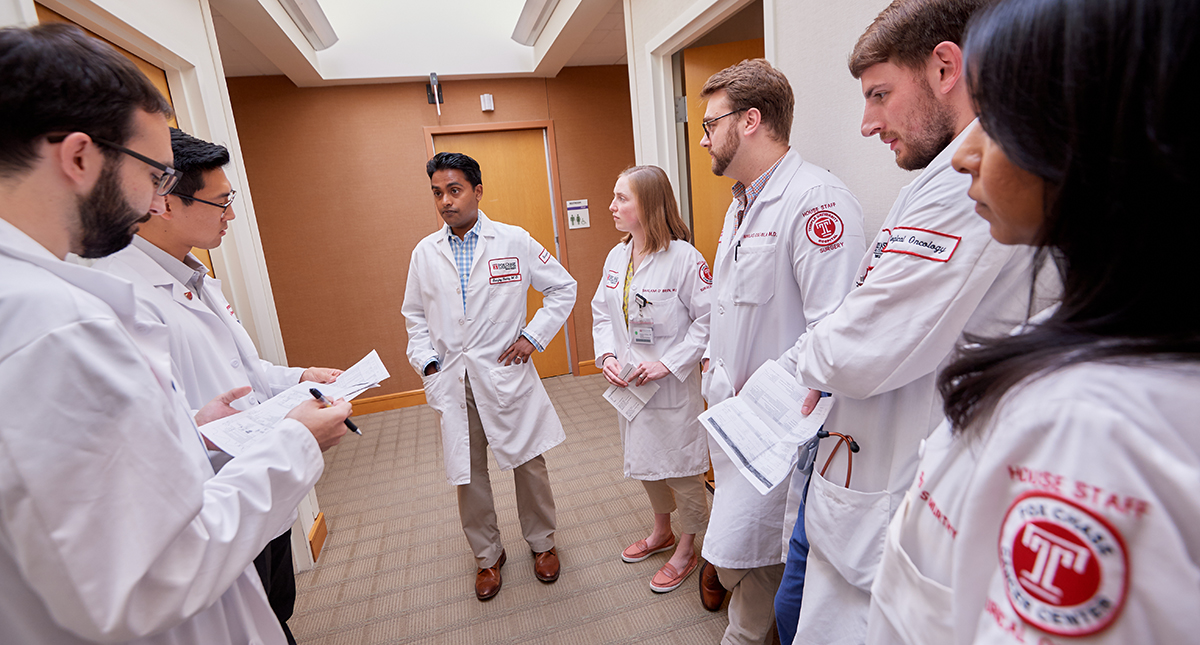
A photograph of Dr. Reddy discussing his patient’s care with several residents, fellows, nurses, and others on the care team. Reddy’s days are all different, but each day his patients are at the center of his work. Some days he sees patients for the first time in the clinic, other days he spends all day operating on patients while their families sit nearby in the waiting area.
He’ll also participate in research meetings on campus, or present complex cases at the Center’s many multidisciplinary conferences.
No matter what he’s doing, each day begins and ends with rounding on each patient in the hospital under his care.
It’s a Monday morning, and Reddy is surrounded by a group of residents and fellows who he’s been teaching for the past year. They make their way to 3 North, the surgical ward, where vital signs, lab results, and the day’s plans of care are laid out. Small changes in a patient’s condition, such as an unexpected lab result, a higher temperature than normal on a 3:00 am vital sign check, or decreased urinary output, can all affect a patient’s outcome. It takes an experienced and attentive team to pick up on them. The focus remains on the team, and the nurses and house staff remain at the core.
Reddy tells his students, “Operating is a learned skill, but it’s the postoperative care that really makes a difference.”
8:00 am, Appointments with Patients in the Office
After checking on his patients, Reddy is in his clinic, ready for a full schedule of patient appointments. Some have just been diagnosed with pancreatic cancer and they’re coming to see what course of treatment he would recommend. Others are postoperative patients, recently having undergone surgery, and some are long-term follow-up patients eagerly awaiting the results of their scans.
Reddy sees many cases of pancreatic cancer each year. Many patients come to Fox Chase for a second opinion, which Reddy highly recommends. The field of pancreatic cancer is constantly advancing. Finding a specialist like Reddy—who’s focused on keeping up with these changes—is important.
His day is packed tight, but each patient gets Reddy’s full attention. His patients will tell you Reddy makes time for any and all questions. He’s a surgeon who talks with you, not at you. These qualities, combined with his skill and expertise, gives patients the confidence they need to take on the difficult path ahead.
Reddy believes in getting to know the people he treats, and he’s often amazed by them. Today, he’s seeing a teacher who’s continuing to work full-time, despite being in the middle of pancreatic cancer treatment. A humbling situation which puts a lot into perspective.
“My patients change their entire lives with this diagnosis, and I’m always blown away by their resilience,” Reddy says.
Not all of Reddy’s pancreatic cases are cancer. He’ll often see patients with a cyst on their pancreas that has been incidentally found. Many patients hear the words “mass on the pancreas” and understandably panic.
Though the majority of these cysts won’t turned into cancer, you can’t always predict which ones will. There are subtle findings to look for which will raise concern. That’s why if you have a pancreatic cyst, it’s best to be followed by someone like Reddy who encounters them on a daily basis.
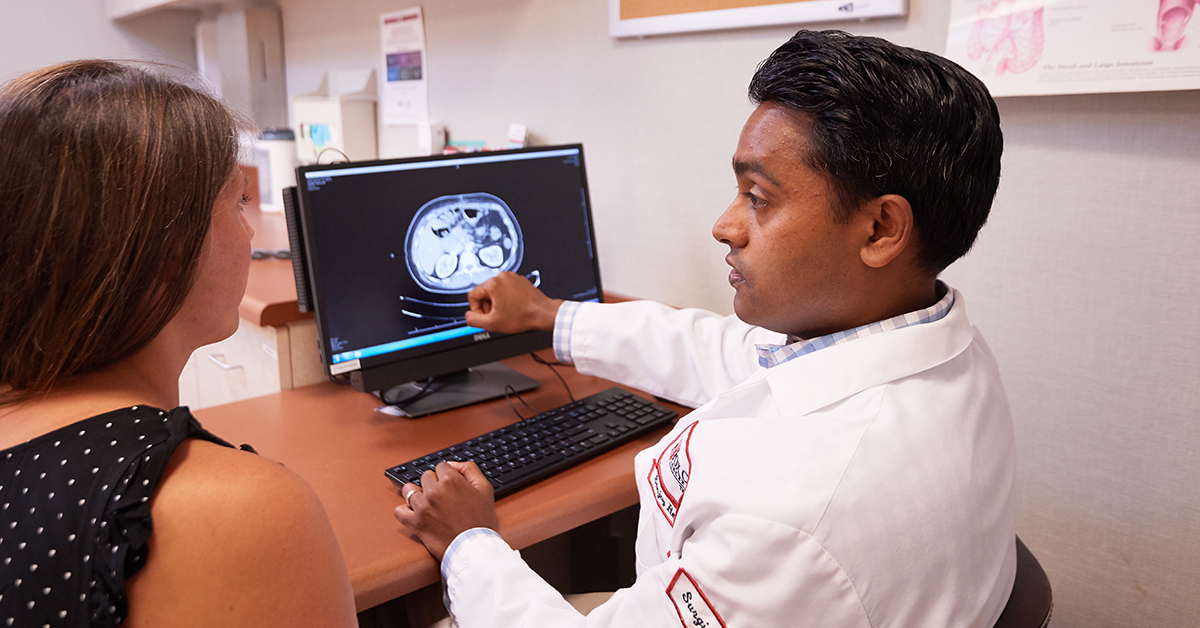
A photograph of Dr. Reddy sitting closely with a patient, pointing at a screen displaying medical imaging results as he discusses them. “These patients need to be monitored and followed closely by a number of specialists. We offer that expertise here,” he says.
The clinic is a busy place. It looks like a block of exam rooms where doctors walk in, talk to patients and families, and walk out. But, much of the critical thinking happens in places patients don’t see.
Behind the scenes, Reddy regularly consults other specialists about his cases. Fox Chase holds bi-weekly tumor boards, where more than a dozen specialists gather to discuss the best course of treatment for the patients who walk through the doors here. Collaboration is built into the foundation of Fox Chase.
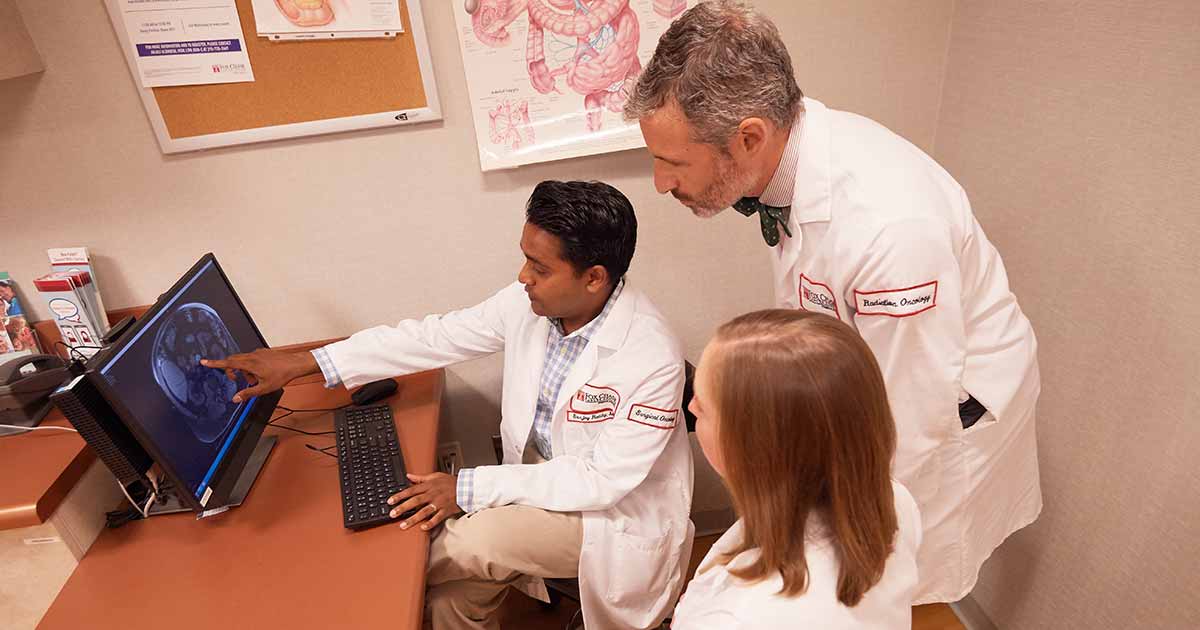
Dr. Reddy gestures at a screen as he discusses a particular case with other Fox Chase doctors and specialists. 12:00 noon, Working Through Lunch
Reddy is eating lunch on the run.
He heads to the West Building where he’ll meet with fellow codirectors of the Marvin and Concetta Greenberg Pancreatic Cancer Research Institute, Edna Cukierman, PhD and Igor Astsaturov, MD, PhD. The three of them discuss how to apply the latest pancreatic research to clinical care.
It’s this translation of lab discoveries into patient care that’s really crucial to our work at Fox Chase.
As an NCI-designated Comprehensive Cancer Center, we believe basic science research is the path to a cure.
Take today’s discussion topic for example: Reddy, Cukierman, and Astsaturov talk about the dense, fibrous stroma, a wall of tissue surrounding pancreatic tumors that can prevent cancer-killing drugs from reaching the tumor. How do we break the stroma down so chemotherapy can target a pancreatic tumor? We are working on various approaches to tackle this, and multidisciplinary discussion between scientists and physicians remains the foundation to progress.
“We are beyond treating the cancer. We want to completely change the way we think about treating pancreatic cancer,” Reddy says.
Bench to bedside, and back again.
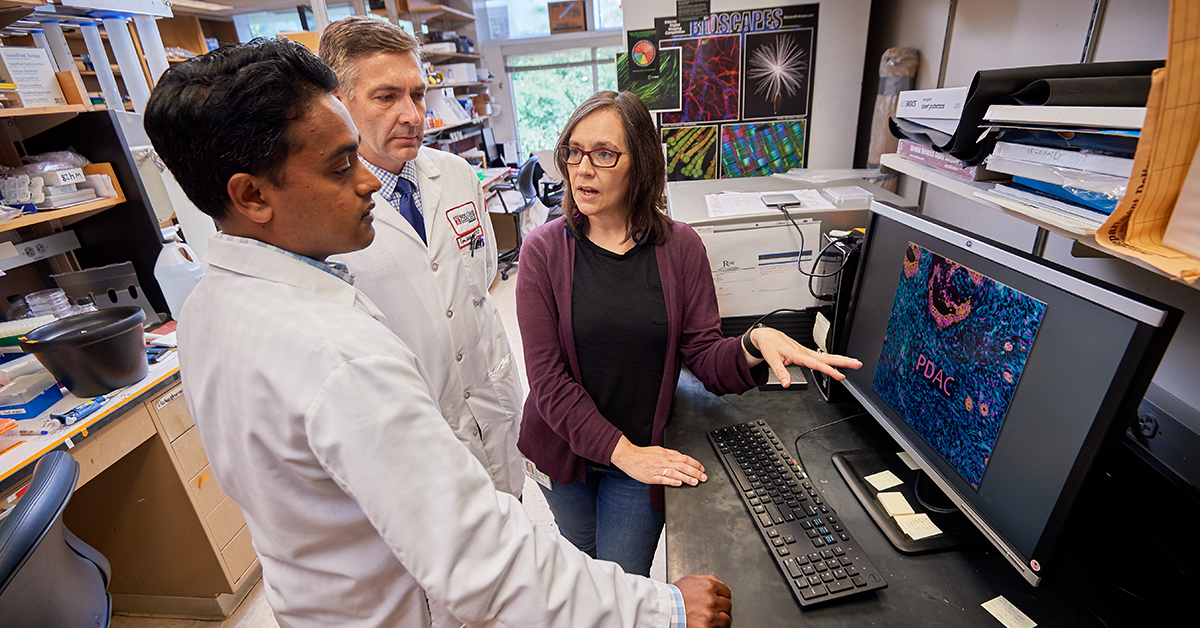
A photo of three Fox Chase doctors talking in a lab, with a computer screen in front of them. 1:00 pm, Scrub-In to the Operating Room
On the way back to the clinic, Reddy pops into the OR. Always willing to lend a hand, Reddy helps another surgeon with a part of a procedure.
Reddy says this spirit of collaboration started during his fellowship years with his mentor, John Hoffman, MD, FACS, a world-renowned pancreatic cancer surgeon and Chief of Pancreaticobiliary Service at Fox Chase.
Under Hoffman’s direction, Reddy learned some of the most advanced surgical techniques to treat pancreatic cancer. Now, as Hoffman prepares to retire, Reddy is ready to take the torch.
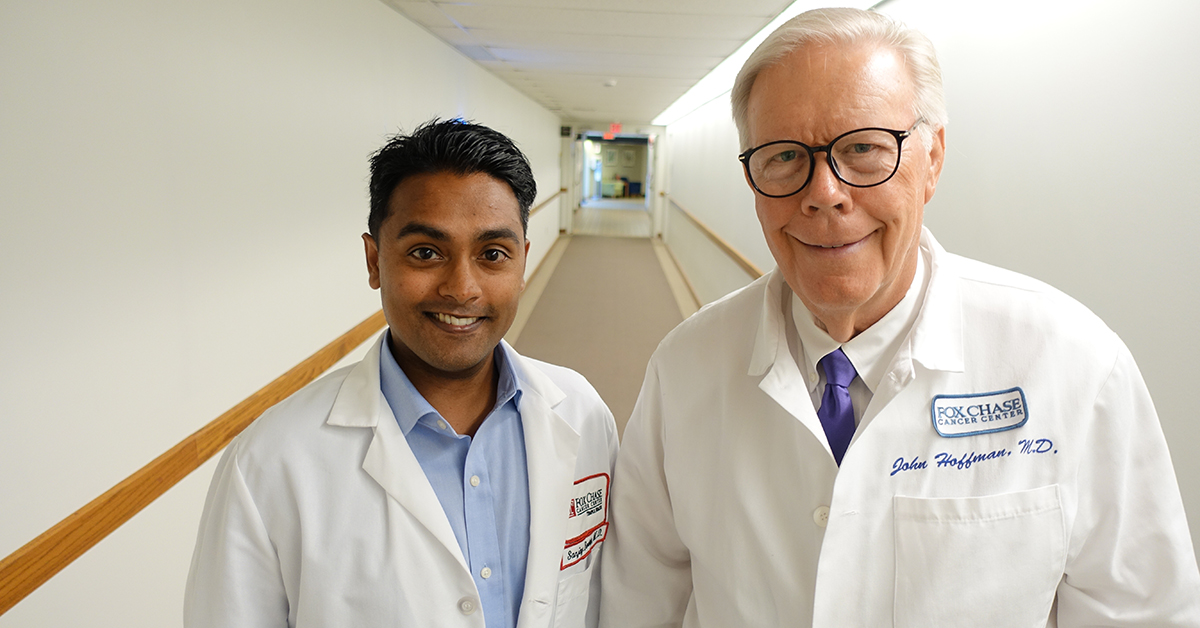
A photograph of Dr. Sanjay Reddy and Dr. John Hoffman standing together in a hallway and smiling at the camera. 6:00 pm, Additional Hospital Rounding
Reddy finishes out his day in much the same way it started—checking in on patients. After he answers every question and finishes every appointment, Reddy heads back up to 3 North where he rounds for the second time today—a practice he picked up from his father, also a surgeon.
He reviews the results of the day and makes sure his patients are all set for the evening. This gives his patients and their families a sense of calm before they drift off to sleep. They can rest, knowing the plan is on track.
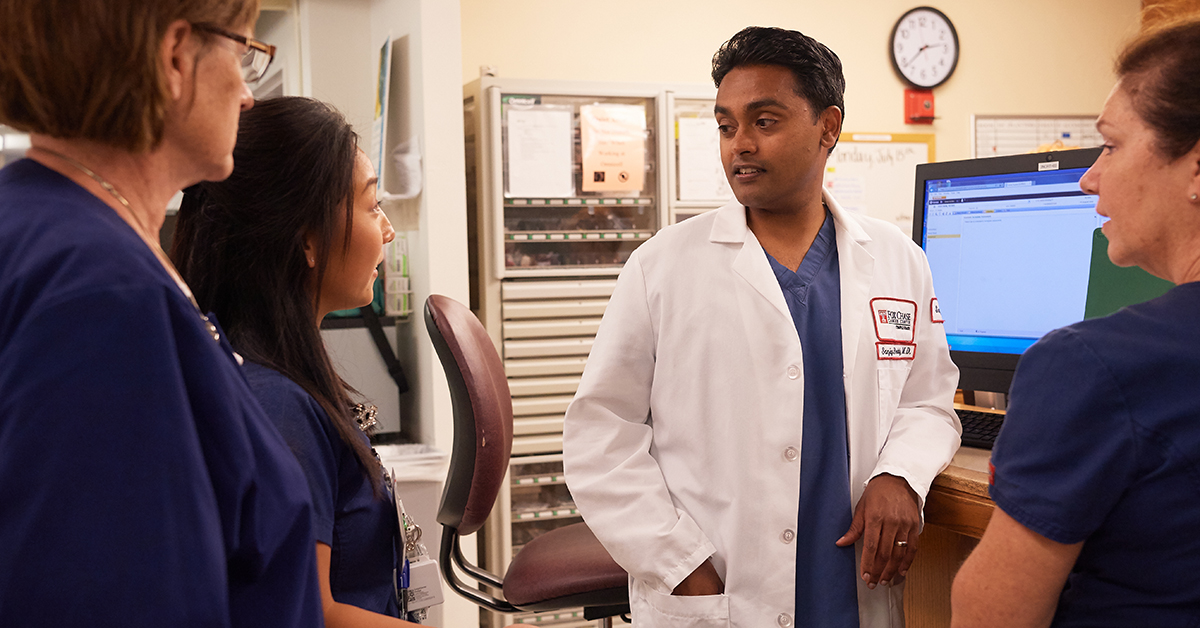
A photograph of Dr. Reddy speaking with three other Fox Chase medical professionals in a medical room, with a computer screen behind him. 7:00 pm, Time to Head Home
Reddy leaves his patients for the day in the capable hands of the nurses, residents, and fellows on the night shift and heads home.
Before his head hits the pillow, Reddy will answer emails and maybe field a call or two throughout the night before his alarm goes off at 5:30 the next morning.
Tonight, he winds down by spending time with this family, thinking about the events of the day and the tough cases he encountered.
“When you look at the numbers, pancreatic cancer survival is tough,” Reddy says. “My dad is a surgeon who operated on many patients with pancreatic cancer. From an early age, I knew these patients were very complex. It is why I chose the path that I did.”
“Because things in life that challenge you, are the things worth doing.”
